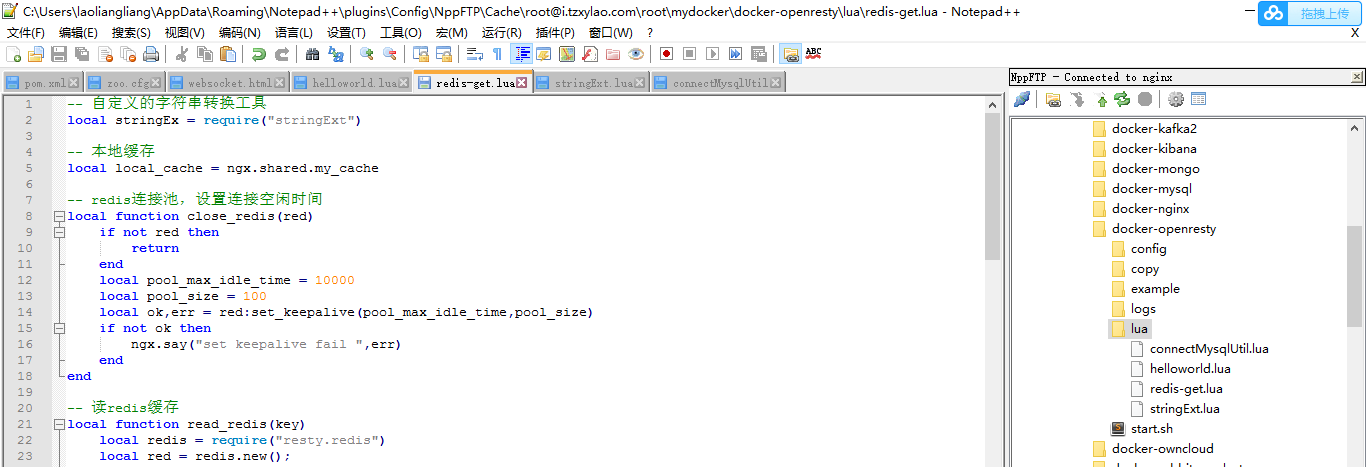1. lua module demo (redis, http, mysql, cjson, local cache)
1.1. configuration
- Set lua_shared_dict my_cache 128m in nginx.conf; open nginx local cache and put it in http {} layer
- location configuration
location /redis-get{
resolver 8.8.8.8;
default_type text/html;
content_by_lua_file /usr/local/openresty/lua/redis-get.lua;
}
- Here we recommend a tool to download a plug-in NppFtp using notepad++. The effect is as follows. You can edit and save the files on liunx directly.

1.2. http
- Remote calls can use this module https://github.com/ledgetech/lua-resty-http
- Copy the two files in the lib package to / usr/local/openresty/lualib/resty
- Called by require("resty.http")
1.3. mysql
- Connection tool
local connectMysqlUtil = {}
local mysql = require "resty.mysql"
-- connect to mysql;
function connectMysqlUtil.connect()
local db, err = mysql:new()
if not db then
return false
end
db:set_timeout(1000)
local ok, err, errno, sqlstate = db:connect{
host = "127.0.0.1",
port = 8083,
database = "test",
user = "dev",
password = "1234",
max_packet_size = 1024 * 1024 }
if not ok then
ngx.say("connect mysql failed")
return false
end
return db
end
return connectMysqlUtilReference resources https://www.cnblogs.com/zhuzi91/p/7879956.html
1.4. string tool
local stringEx = {}
function stringEx.ToStringEx(value)
if type(value)=='table' then
return stringEx.TableToStr(value)
elseif type(value)=='string' then
return "\'"..value.."\'"
else
return tostring(value)
end
end
function stringEx.TableToStr(t)
if t == nil then return "" end
local retstr= "{"
local i = 1
for key,value in pairs(t) do
local signal = ","
if i==1 then
signal = ""
end
if key == i then
retstr = retstr..signal..stringEx.ToStringEx(value)
else
if type(key)=='number' or type(key) == 'string' then
retstr = retstr..signal..'['..stringEx.ToStringEx(key).."]="..stringEx.ToStringEx(value)
else
if type(key)=='userdata' then
retstr = retstr..signal.."*s"..stringEx.TableToStr(getmetatable(key)).."*e".."="..stringEx.ToStringEx(value)
else
retstr = retstr..signal..key.."="..stringEx.ToStringEx(value)
end
end
end
i = i+1
end
retstr = retstr.."}"
return retstr
end
function stringEx.StrToTable(str)
if str == nil or type(str) ~= "string" then
return
end
return loadstring("return " .. str)()
end
return stringEx1.5. Integrate redis + local cache
-- Custom String Conversion Tool
local stringEx = require("stringExt")
-- Local cache
local local_cache = ngx.shared.my_cache
-- redis Connection pool, setting connection idle time
local function close_redis(red)
if not red then
return
end
local pool_max_idle_time = 10000
local pool_size = 100
local ok,err = red:set_keepalive(pool_max_idle_time,pool_size)
if not ok then
ngx.say("set keepalive fail ",err)
end
end
-- read redis cache
local function read_redis(key)
local redis = require("resty.redis")
local red = redis.new();
local ok,err = red:connect("127.0.0.1",8084)
if not ok then
ngx.say("connect fail ",err)
return close_redis(red)
end
red:set_timeout(1000)
local count,err = red:get_reused_times()
if 0==count then
ok,err = red:auth("123456")
if not ok then
ngx.say("auth fail ",err)
return close_redis(red)
end
elseif err then
ngx.say("fail to get reused times")
return close_redis(red)
end
local res,err = red:get(key)
if not res then
ngx.say("get msg fail ",err)
return close_redis(red)
elseif res then
ngx.say(" set expire 10000 ")
red:expire(key,10)
end
local_cache:set(key,res,5)
ngx.say("read from redis ")
ngx.say(res)
close_redis(red)
end
-- http Request parameters
local args = ngx.req.get_uri_args()
local key = args["key"]
if not key then
ngx.say("key must be exist")
return
end
local keyCache = local_cache:get(key)
if not keyCache then
local res = read_redis(key)
if not res then
ngx.say("redis is null")
end
else
ngx.say("read from localCache ")
ngx.say(keyCache)
end
-- http Call tool, need additional download, address: https://github.com/ledgetech/lua-resty-http: https://blog.csdn.net/xiejunna/article/details/53445342
local http = require("resty.http")
local httpc = http.new();
if not httpc then
ngx.say("\n\r httpc new fail")
end
httpc:set_timeout(8000)
-- keepalive Failure to write parameters may result in error reporting
local res,err = httpc:request_uri("http://www.xxx.com",{
method="POST",
path="/xxx/rpc.api",
body = 'a=1&b=2',
headers = {
["Content-Type"] = "application/x-www-form-urlencoded",
},
keepalive_timeout = 60,
keepalive_pool = 10
})
if not res then
ngx.say("httpc call fail ")
return
end
local cjson = require("cjson")
local json = cjson.new()
if not json then
ngx.say("json is null")
return
end
-- Test call results
-- ngx.say(stringEx.TableToStr(res))
-- ngx.say(stringEx.ToStringEx(json.decode(res["body"])))
-- ngx.say(type(json.decode(res["body"])))
-- ngx.say(stringEx.ToStringEx(json.decode(res["body"])["header"]["request_seq"]))
-- ngx.say(type(json.decode(res["body"])["header"]))
-- ngx.say(type(json.decode(res["body"])["header"]["request_seq"]))
local connectMysqlUtil = require("connectMysqlUtil")
local db = connectMysqlUtil.connect()
if not db then
ngx.exit(ngx.HTTP_INTERNAL_SERVER_ERROR)
return
end
local res,err,errcode,sqlstate = db:query("select * from t_uls_order_info where order_id='20190119232946000023'",10)
if not res then
ngx.say("bad request: ",err,":",errcode,": ",sqlstate,".")
return
end
ngx.say("result:",json.encode(res))
1.6. summary
- This paper records the basic usage of http, mysql, redis, nginx local caches. The following requirements for using this module can be directly referred to modify the sample code.
- For the actual demand of the Internet, we can imagine a demand based on these modules. First, read the ngnix local cache, which has a short expiration time. Second, read the redis cache to reduce the redis pressure, and further reduce the mysql reading pressure.